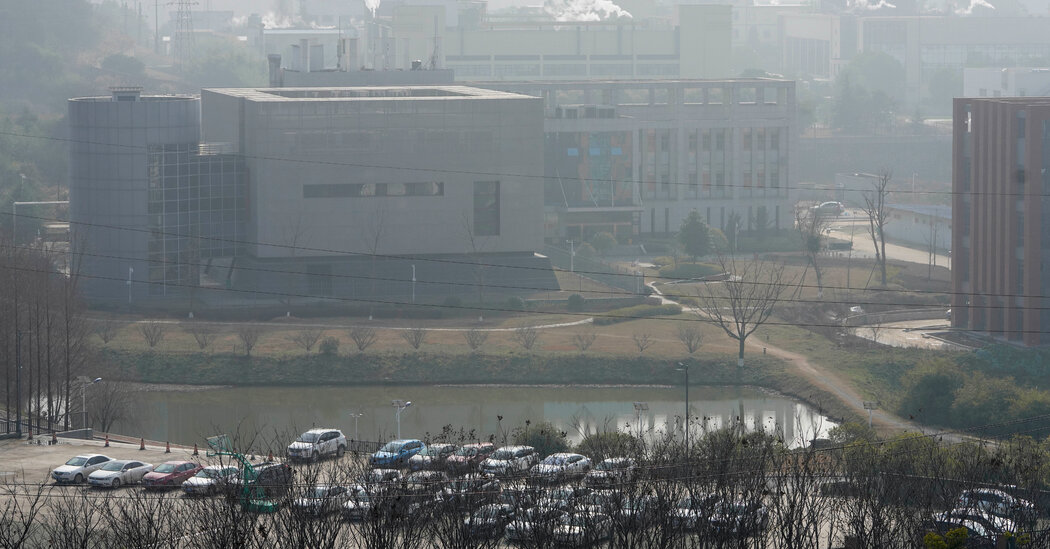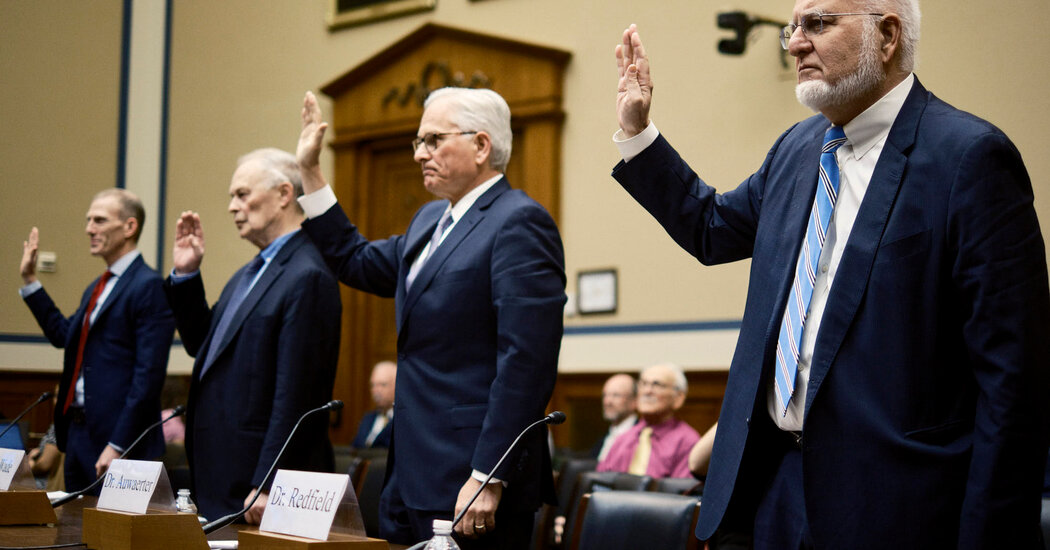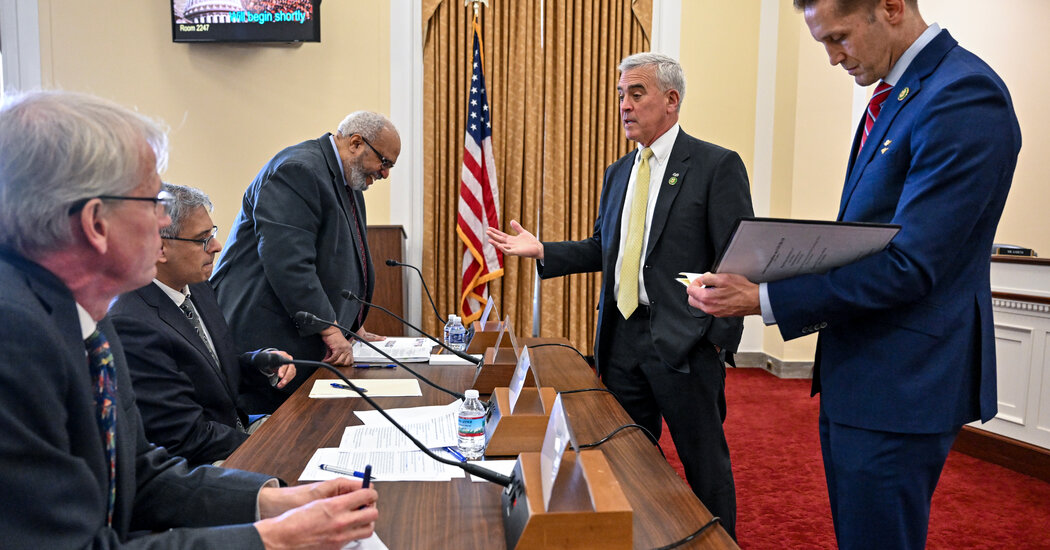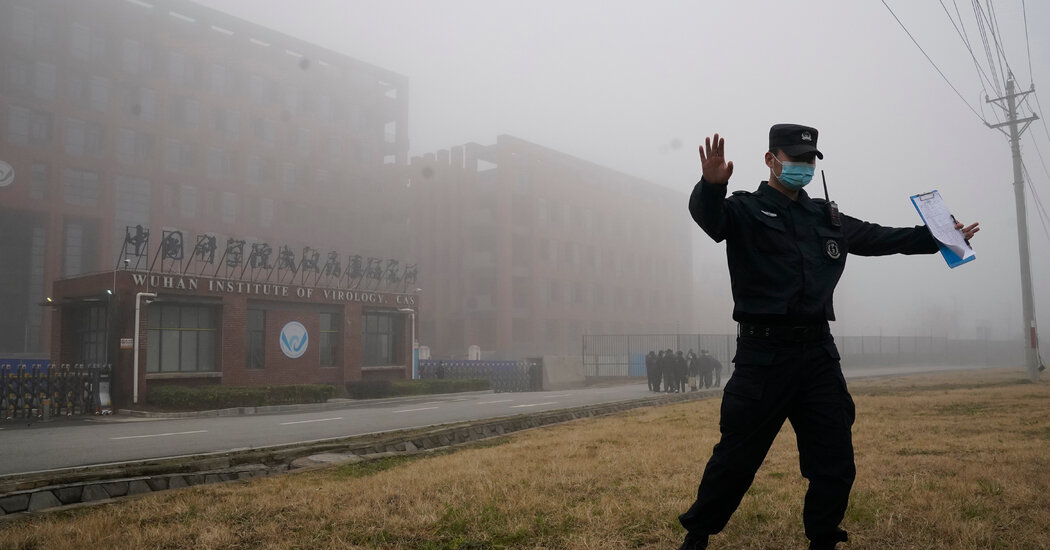Lab Leak or Not? How Politics Shaped the Battle Over Covid’s Origin
A lab leak was once dismissed by many as a conspiracy theory. But the idea is gaining traction, even as evidence builds that the virus emerged from a market.WASHINGTON — In the spring of 2021, with studies of the coronavirus pandemic’s origins going nowhere and the issue embroiled in bitter partisan politics, David Relman, a microbiologist at Stanford, quietly made a request of his congresswoman.He told his representative, Anna Eshoo, that he was organizing a letter from leading scientists calling for an open and independent investigation into the origins of Covid-19 — including into whether it had come from a laboratory in Wuhan, China. He wanted to know if she would publicly endorse the idea.The outreach worked. As soon as the letter appeared online in the prestigious journal Science, Ms. Eshoo became one of the first Democrats in Congress to call for an investigation into the origins of Covid.It was the prelude to a political sea change on the issue: Within weeks, President Biden ordered a top-to-bottom intelligence review of how the pandemic began, which has since come to mixed conclusions.David Relman, a microbiologist at Stanford, who called for an independent investigation into the origins of Covid-19.Jason Henry for The New York TimesThe story of the hunt for Covid’s origin is partly about the stonewalling by China that has left scientists with incomplete evidence, all of it about a virus that is constantly changing. For all the data suggesting that the virus may have jumped into people from wild animals at a Chinese market, conclusive proof remains out of reach, as it does for the competing hypothesis that the virus leaked from a lab.But the story is also about politics and how both Democrats and Republicans have filtered the available evidence through their partisan lenses.Some Republicans grew fixated on idea of a lab leak after former President Donald J. Trump raised it in the early months of the pandemic despite scant evidence supporting it. That turned the theory toxic for many Democrats, who viewed it as an effort by Mr. Trump to distract from his administration’s failings in containing the spread of the virus.The intense political debate, now in its fourth year, has at times turned scientists into lobbyists, competing for policymakers’ time and favor. Dr. Relman is just one of several researchers and like-minded thinkers who has successfully worked the corridors of power in Washington to force journalists, policymakers and skeptical Democrats to take the lab leak idea seriously.But the political momentum has not always aligned with the evidence. Even as the idea of an accidental lab leak has now gained standing in Washington, findings reported last week bolstered the market theory. Mining a trove of genetic data taken from swabs at the Huanan Seafood Wholesale Market in Wuhan in early 2020, virus experts said they found samples containing genetic material from both the coronavirus and illegally traded raccoon dogs. The finding, while hardly conclusive, pointed to an infected animal.The new data from the market suggests that China is holding onto clues that could reshape the debate. But for now, at least, the idea of a lab leak seems to have prevailed in the court of public opinion: Two recent polls show that roughly two-thirds of Americans believe that Covid probably started in a lab.In January 2020, members of the Wuhan Hygiene Emergency Response Team searched the closed Huanan Seafood Wholesale Market in Wuhan.Noel Celis/Agence France-Presse — Getty Images‘Conspiracy Theories’In January 2020, as the virus began circulating in Wuhan, Matthew Pottinger, a deputy national security adviser to Mr. Trump who had worked as a reporter in China, developed suspicions about the Wuhan Institute of Virology, known for its advanced research on bat coronaviruses.Mr. Pottinger quietly made a formal request asking intelligence officials to investigate the new outbreak.In Washington’s polarized ecosystem, the notion that the virus could have come from the Wuhan lab was seeping into public debate. On Capitol Hill, Senator Tom Cotton, Republican of Arkansas, raised the idea in a Senate hearing and on Twitter.Around that same time, according to emails disclosed later, some American virologists privately told health officials, including Dr. Anthony S. Fauci, then the director of the National Institute of Allergy and Infectious Diseases, that the virus could have been engineered in a lab, but required more study.When they examined data, including on naturally occurring viruses that shared critical features with the new virus, they concluded the opposite. In a study, they wrote that the virus was “not a laboratory construct or a purposefully manipulated virus.”The study also said the virus was unlikely to have evolved in the course of certain laboratory experiments. (It did not look closely at whether a scientist collecting or isolating a natural virus could have accidentally released it, a hypothesis for which there remains no direct evidence.)Those findings reinforced the view from a February 2020 letter in The Lancet in which scientists, worried that lab leak fears threatened data sharing from China, condemned “conspiracy theories” about a lab-related origin.President Trump in April 2020, at one of the daily White House coronavirus briefings.Doug Mills/The New York TimesProminent scientists may have been publicly aligned, but the president did not share their view. At the end of April 2020, Mr. Trump announced that he had seen intelligence that supported a lab leak but was “not allowed” to share it. Mr. Pottinger said that he did not recall briefing Mr. Trump on the origins question, and that he did not see the president’s comment coming.Democrats showed little inclination to investigate the pandemic’s origins. Like the president’s references to the “China virus,” his suggestion of a lab leak sounded to them like xenophobia and risked fueling anti-Asian sentiment. They trusted Dr. Fauci, who had said that the evidence strongly suggested that the virus had not been manipulated. (He has since said he is open to the idea of a lab accident.) Ms. Eshoo said his comments made her doubt those espousing a lab leak theory.“It seemed to me that Dr. Fauci, whatever he knew, did not lead him to believe what they were believing,” Ms. Eshoo said.Rep. Anna Eshoo arrives at the Rayburn House Office Building for a hearing in May 2020.Anna Moneymaker/The New York TimesChanging Democrats’ MindsWhen Mr. Biden won the 2020 election, some experts who called for a fuller investigation of the lab leak hypothesis saw an opportunity to persuade Democrats to give the idea a closer look.In December 2020, Jamie Metzl, a biosecurity and technology expert at the Atlantic Council who had worked in the Clinton administration, arranged a private telephone call with Jake Sullivan, the incoming national security adviser. Mr. Metzl made the case, he said, “that a research-related origin was a very real possibility.”Mr. Metzl joined a small group, organized by French and Belgian scientists, who had said the lab leak hypothesis could not be ruled out. The scientists, he said, were having trouble getting letters published in science journals. With Mr. Metzl’s help, the group published its views in news outlets around the world.Around the same time, in March 2021, some virus experts became frustrated by a much-anticipated report on the pandemic’s origins by the World Health Organization and China.The report did not trace Covid cases as far back as experts wanted. And it ranked the idea of the virus being carried to Wuhan on frozen food packages — an improbable scenario, but one that China favored because it could push blame beyond the country’s borders — as more likely than a laboratory incident.There was still no evidence of a lab leak, but so much remained unknown — and China seemed so determined to stand in the way of answers — that more scientists began urging a closer look.Dr. Relman of Stanford organized the letter to Science with other prominent colleagues, including Alina Chan, a scientific adviser at the Broad Institute in Cambridge, Mass., and Jesse Bloom, a virologist at the Fred Hutchinson Cancer Center in Seattle.In August, Mr. Metzl helped plan a private bipartisan briefing for senators about the lab leak hypothesis, where Dr. Relman and Dr. Bloom spoke.“I left the meeting with a much more open mind,” said Senator Richard Blumenthal, Democrat of Connecticut.Market CluesAs backers of the lab leak idea made their case in Congress, Michael Worobey, an evolutionary biologist at the University of Arizona, set out to test those claims. Having once investigated — and helped to discredit — a theory that AIDS came from contaminated polio vaccines, he believed a lab leak was possible and so he signed the Science letter.He first nudged the scientific journal Nature, he said, to request that researchers from the Wuhan Institute of Virology make available genetic sequences of previous coronaviruses they had reported in the journal. They did, and shortly thereafter, in May 2021, posted a study describing those viruses, none of which was closely enough related to the pandemic virus that genetic tinkering could have produced it.Next, Dr. Worobey analyzed the earliest known Covid patients, finding that a disproportionate number had worked at or visited the market.Meanwhile, evidence emerged that live mammals known to spread coronaviruses — including raccoon dogs — were being sold at the Huanan market before the pandemic. And in September 2021, a report of coronaviruses recently discovered in Laotian bats showed that naturally occurring viruses were capable of latching onto human cells.Michael Worobey, an evolutionary biologist at the University of Arizona who studied the origins of Covid after calling for an open investigation of all hypotheses.University of ArizonaNew information about the work of the Wuhan Institute of Virology was also intensifying concerns about a lab leak, even as hard evidence of such an incident remained elusive.To some scientists, the institute’s efforts to study never-before-seen coronaviruses raised questions about what else it might have collected. Those questions turned more pointed with news in the fall of 2021 that EcoHealth Alliance, a research organization, had sought Defense Department funding in 2018 to partner with the virology institute on experiments that would have genetically altered coronaviruses.The proposal was not funded. But the concerns fueled Republican attacks on Dr. Fauci for his institute’s funding of other EcoHealth projects and drew attention to the lab leak theory.Richard Ebright, a molecular biologist at Rutgers University who had publicly argued that a lab leak should be considered, said he helped Congressional aides vet questions that Senator Rand Paul, a Republican, wanted to ask Dr. Fauci at upcoming hearings. And Dr. Relman said that he tried to help Republicans on the House Energy and Commerce Committee, who were examining the research, find common ground with Democrats.Congressional inquiries gained steam even as Dr. Worobey’s research leaned toward a market origin. In February 2022, he and others reported that the clustering of early Covid cases around the Huanan market could not be explained purely by chance. A second study by the team, looking at the genetic diversity of viruses collected early in the outbreak, also pointed to the market.The studies, published in Science, persuaded many virologists that the notoriously risky wild animal trade had, as on previous occasions in China, ignited a deadly outbreak.But some scientists and lawmakers were unconvinced. In the Senate, aides were many months into a bipartisan investigation of the origins of the pandemic, including the lab leak idea. The resulting report — in a sign of enduring partisan divisions, it was endorsed only by Republicans — said that safety risks at the Wuhan Institute of Virology made a lab leak likely. But it presented no direct evidence to suggest it had actually occurred.Weeks after the report’s release, Republicans won control of the House.Toxic PoliticsJamie Metzl, senior fellow at the Atlantic Council, testifies at a hearing on March 8 with fellow witnesses, from left, Nicholas Wade, former science editor at The New York Times, Paul Auwaerter, a professor at Johns Hopkins School of Medicine, and Robert Redfield, the former director of the Centers for Disease Control and Prevention.T.J. Kirkpatrick for The New York TimesThis month, the new House Subcommittee on the Coronavirus Pandemic convened its first hearing to examine the pandemic’s origins. The market theory was barely discussed.Some scientists saw the hearing as one-sided and rife with scientific inaccuracies. Dr. Ebright, though, saw an opportunity. With House Republicans leading Covid hearings and Democrats holding the Senate by only a slim majority, he hopes to mobilize the public to push for bipartisan Senate hearings on Covid origins.“The political balance is on the knife’s edge,” he said. “A very small amount of advocacy could have significant impact.”Other scientists, though, said that the campaign by lab leak proponents, far from creating a more open discussion, had given rise to such vitriolic attacks that many researchers are reluctant to speak publicly about the issue.The latest raccoon dog data, which virologists said added to compelling evidence for a market origin, created fresh pressure on China to share information that may link Covid’s origin to wild animals. But others said the new findings related to the market, like previous ones, contained holes.“I worry a lot about our jumping on tidbits that are incomplete and cannot be verified,” Dr. Relman said.After three years of divisive politics, Ms. Eshoo said she would like the Covid origins inquiry to be taken out of Congress’s hands and turned over to an independent panel.“If you take partisan politics and you mix that with science,” she said, “it’s a toxic combination.”Kitty Bennett
Read more →



